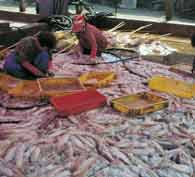This is the VOA Special English Agriculture Report.
Some pirates catch fish instead of ships. The problem is known as illegal, unreported and unregulated fishing. Such fishing harms the productivity of fisheries, and hurts developing countries especially.
The fish pirates can easily land in ports that are not well controlled. Then they sell their catch at prices too low for the local fishing industry to compete. The catch may enter international markets, yet rob communities of needed food and raise the risk of fishery collapse.

But last month, the governing conference of the United Nations Food and Agriculture Organization approved a new treaty. The agreement, once it takes effect, will be the first under international law to target just this problem.
It has a long name: the Agreement on Port State Measures to Prevent, Deter and Eliminate Illegal, Unreported and Unregulated Fishing. The F.A.O. says that by signing the treaty, governments promise to take steps to guard their ports against ships involved in such fishing.
The behavior of a fishing boat is mainly the responsibility of the nation whose flag it flies. The new treaty is directed at countries where fishing ships enter port. The aim is to get the countries to identify, report and deny entry to offending vessels.
To land, foreign fishing ships will have to request permission from ports that are able to inspect them. And before they arrive, they will have to send information on their activities and the fish they are carrying. If a ship is denied entry, other ports will be told. And the nation whose flag it is sailing under must take action.
The agreement will take effect once 25 countries have ratified it into law after signing it. Eleven members of the Food and Agriculture Organization immediately signed the treaty. They included Angola, Brazil, Chile, the European Union, Indonesia and Iceland. The others were Norway, Samoa, Sierra Leone, the United States and Uruguay.
Activists with the Pew Environment Group say countries should use the measures even before the treaty takes effect. The group notes that a past fishing treaty took almost ten years to come into force.
But the director of international law programs at Southern Illinois University is more hopeful. Cindy Buys thinks the treaty might take effect in only about a year. But she points out that the success of the treaty depends on the ability of nations to enforce it.
And that's the VOA Special English Agriculture Report, written by Jerilyn Watson. You can find transcripts at voaspecialenglish.com. I'm Jim Tedder.
Related stories:
钓鱼许可证 Fishing license
Study finds some ocean fisheries are recovering
New model predicts mammal extinction
From fishing village to bustling metropolis
(来源:VOA 编辑:陈丹妮)